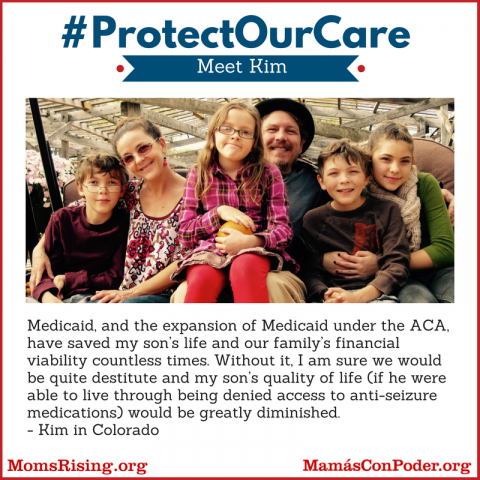
Quality, affordable healthcare coverage is incredibly important to families in the U.S.
MomsRising has recieved thousands of messages from our volunteers with stories about why the Affordable Care Act (a.k.a. Obamacare), Medicaid, CHIP, and Medicare matter for the health of their families. This #ProtectOurCare blog series will highlight many of the stories we've received.
From Kim in Colorado:
My family’s healthcare story starts with the fact that my husband is self-employed and, for us, finding affordable health insurance after I was laid off from my job with a publishing company in 2002 has been a huge challenge. Shortly after being laid off from my job I found out I was pregnant. We were able to stay on my company’s insurance for a while, and though I had some preterm labor complications (and by necessity went on bedrest for a few months) our first daughter was born full term and quite healthy in 2003. After she was 6 months old, I returned to work part time. We moved from Denver to Greeley (even though we would be moving away from family and help with childcare) because houses were significantly more affordable and I started working from home.My husband took a job with a new company and we were in a “waiting period” for insurance when I became pregnant again in 2004. Because we did not technically have maternity insurance, we waited to have the initial ultra sound. It took longer than we thought for insurance to cover us. At 20 weeks, my doctor decided we should do a “quick” ultra sound with his assistant just to check on things. It turned out we were expecting twins! The news was exciting and also scary. It turned out our twins were most-likely identical (they shared the outer amniotic sac). We did not know the location of the placenta(s). Identical twins that share a placenta and/or amniotic sac(s) are at much higher risk for complications during pregnancy, so we were monitored closely. Things were going well, then at 31 weeks I went into labor. Because we were just shy of the 32 week mark, we were flown via helicopter to Presbyterian St. Luke’s Hospital in Denver. The delivery went quickly and well, but one twin was born bright red and the other anemically pale. They had experienced twin-to-twin transfusion during birth: a condition where one twin transfuses blood through the placenta to the other twin. It is often life-threatening when it happens during gestation. Our twin boys spent the next 7 weeks in the NICU.When they came home they were very challenging babies—colicky and still learning to feed. At about 9 months I noticed Jack was not reaching milestones his brother Dylan was reaching (rolling over, etc.). At a follow up visit at Pres. St. Luke’s he was tested and they recommended he get an MRI and see a neurologist. The MRI determined he had suffered a grade IV brain bleed (most-likely at birth) and had moderate Cerebral Palsy. During this time we were struggling to pay the astronomical medical bills from the helicopter ride ($21,0000) and the 7 week stay at the NICU (upwards of $150,000 for each child). We negotiated with the hospitals to pay what we could on a payment plan. Things were very tight. Jack started receiving physical and, eventually, speech therapies at home. There were many visits to the doctor. About this time, it was recommended to me to apply for Medicaid for my disabled child, which I did and he then received. In early 2007, our youngest daughter was born, healthy and full-term. In late 2007 my husband’s employer had to cut way back on his hours and he then started his own business. We had to shop for individual health insurance and could not afford to insure everyone in our family. So my husband and I went without health insurance for several years. Eventually we applied for Medicaid coverage for our other 3 children, which they then received.Jack started walking when he was 3 1/2 years old, thanks to very hard work with physical therapists and sheer determination. When Jack was 4 he had a selective dorsal rhizotomy surgery: A ten-hour surgery on his spinal cord to selectively sever certain nerves to greatly lessen the high muscle tone in his lower extremities. Recovery from this surgery was an 8 week in-hospital stay, with intense physical therapies. In 2011 Jack had a series of grand mal seizures and we nearly lost him. There were several trips to the ER and a sleep study. After this, my husband and I applied for Medicaid through the expansion of Medicaid under the ACA and have been receiving it since then. Two years later, Jack had several more grand mal seizures and he has been on anti-seizure medications ever since. He has not had another seizure to date. Jack walks but falls often. We have been to the ER many times for stitches and once (amazingly, only once so far!) for a concussion. Living with a child with a disability is hard on morale. It is hard on a marriage. We work hard and love each other and stick together. Jack is an amazing human being, who has gone through every hurdle in his life with a smile. He would give you the shirt off his back with that same sweet smile.My husband’s business continues to pay the bills, but we live very frugally on less than $30,000 a year. Medicaid, and the expansion of Medicaid under the ACA, have saved my son’s life and our family’s financial viability countless times. Without it, I am sure we would be quite destitute and my son’s quality of life (if he were able to live through being denied access to anti-seizure medications) would be greatly diminished. Please do not take away this safety net for millions of Americans like our family. We are depending on you.
You can read more stories from parent across the country here: https://s3.amazonaws.com/s3.momsrising.org/images/Lifesaver_Book_-_Final...
And if you have a story of your own you'd like to share, you can submit it here: http://action.momsrising.org/survey/healthcare-stories/



The views and opinions expressed in this post are those of the author(s) and do not necessarily reflect those of MomsRising.org.
MomsRising.org strongly encourages our readers to post comments in response to blog posts. We value diversity of opinions and perspectives. Our goals for this space are to be educational, thought-provoking, and respectful. So we actively moderate comments and we reserve the right to edit or remove comments that undermine these goals. Thanks!